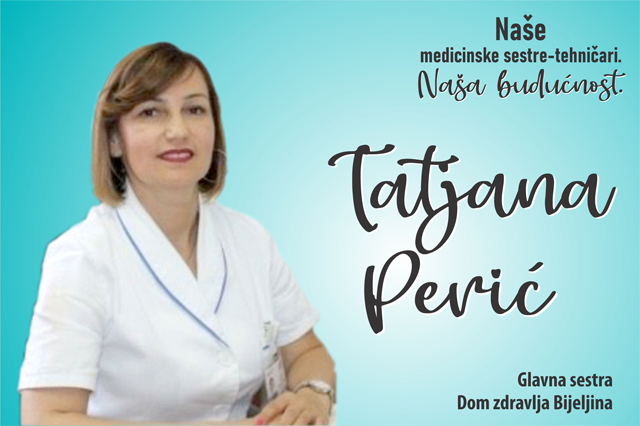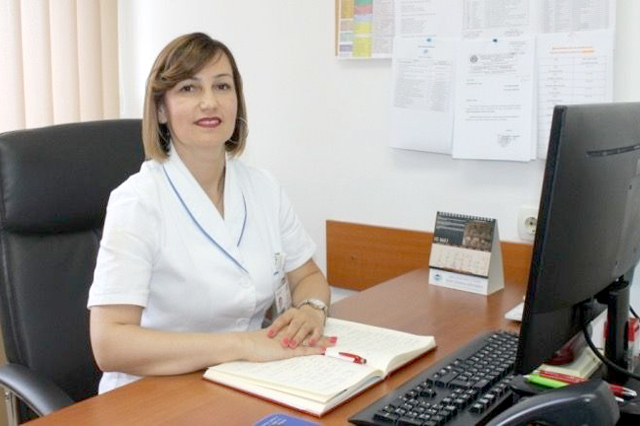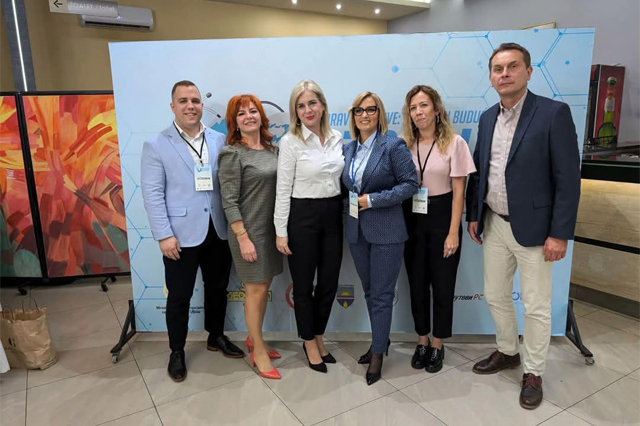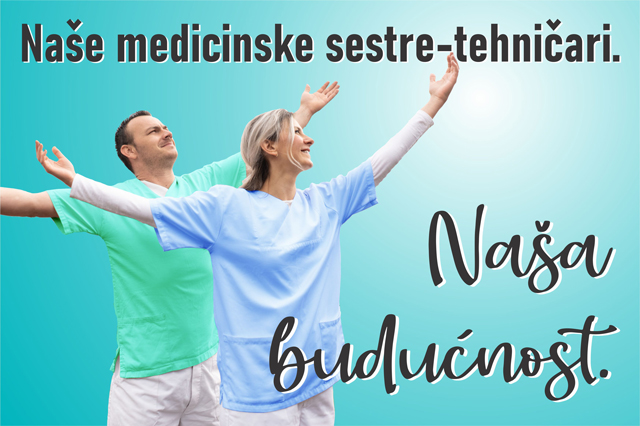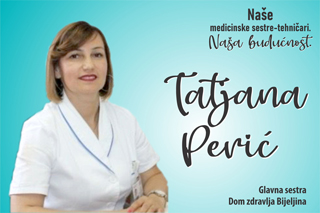
Tatjana Peric is a nurse from Bijeljina. She currently holds the position of Head Nurse of the Primary Health Care Center Bijeljina.
She completed nursing high school in Bijeljina. She has been working at Primary Health Care Center (PHCC) Bijeljina since 1997. She started as a General Practice Nurse and later on became a Community Nurse. In 2007, she completed additional education in family medicine, and in 2013 she graduated from the University of Bijeljina, majoring in nursing, and earned the title of graduate nurse. In addition, she also completed training in psychophysical preparation of pregnant women for childbirth and earned the title of graduate healthcare manager at the University of Banja Luka in 2021. She has been the President of the Nurses Association of Republika Srpska since November 2022.
How old were you when you started your professional career and what inspired you to choose this profession... I started working when I was 19 years old. Since my childhood, I had a desire to help people and work in healthcare, because I believed that it is a profession that allows for a direct impact on people's lives, and for that reason I chose medicine.
What does a typical workday look like... My working day starts with a morning meeting with the team to go over the schedule, plan activities and resolve current issues. During the day, I coordinate the work of the nursing staff, provide support in working with patients, participate in the organization of health services, and also deal with administrative tasks. I hold internal trainings for nurses. I participate in meetings with the management, doctors and other health professionals, in order to improve the work of the PHCC.
What is it like to be a nurse in Bosnia and Herzegovina... To be a nurse in BiH is very challenging but also fulfilling. Working in healthcare requires a high level of dedication, empathy and expertise. Given the difficult conditions and workload, team support and continuous education are extremely important.
What are the shortcomings of the Primary Health Care Center Bijeljina? What would you change? There should be more training for nurses to increase their efficiency and expertise. Teamwork is of a great importance. Certainly, more effort should be made to improve teamwork.
What are the major challenges that nurses face in their daily work? The biggest challenges are mainly work overload, work in shifts, stress that accompanies work with sick and injured patients, as well as administrative duties that take up a significant amount of time. We also face constant need for additional education and adaptation to new technologies and working methods. A large number of nurses leave abroad in search for better conditions, which leads to work overload for those who remain. Daily contact with patients with serious health conditions requires emotional strength and resilience. Although they are essential for the functioning of the healthcare system, nurses often face insufficient support and recognition for what they do. Working in hospitals and primary health care centers carries a constant risk due exposure to infectious diseases, especially during epidemics. Although there are training programs, they are not always available to everyone, and career advancement is rather challenging.
What kind of support to nurses would you like to receive from society and institutions? Society and institutions should invest more in the education and professional development of nurses. They should also ensure better working conditions, adequate salaries and recognition of our work. A good support system, which would include psychological help and counseling, would also be useful, given the stress our job carries.
How important are the nurse-patient and nurse-doctor relationships? The relationships between a nurse and a patient or a doctor are crucial for provision of high quality healthcare. A nurse must be empathetic and communicative with patients. On the other hand, relationship with doctor should be based on mutual trust, cooperation and respect, because only in this way we can provide the best possible healthcare. Teamwork and good communication are essential for provision of high quality healthcare. Clear and open communication between a nurse and a doctor allows for understanding of the patient's needs and optimizing treatment. Nurses often have direct contact with patients and can notice things that doctors may not, so it is important that information is exchanged quickly and accurately. Nurses must trust the doctors' decisions, while doctors need to trust the nurses’ assessments.
What motivates you and what do you find the most fulfilling about working with patients? My greatest motivation is the opportunity to help patients and support them through difficult times. When I see a patient progress or feel better thanks to my work, it gives me a huge sense of fulfillment and pride. Achieving a common goal – improving the health of patients, provides a feeling of unity and professional satisfaction. The role of nurse is not only to provide care, but also to help patients feel empowered, informed and involved in their own treatment.
How did the Covid-19 pandemic affect the status and role of nurses in BiH... The Covid-19 pandemic has significantly increased the role of nurses, as we ended up on the front lines of the fight against the virus. Our responsibility became even greater, and the work became extremely stressful and difficult. However, the pandemic raised awareness about importance of our work. When patients express gratitude or praise for kindness, attention and expertise, it motivates health professionals to continue working, with the same dedication and passion.
How different are the working conditions of nurses in the private and public sectors? In private institutions, there are usually better financial conditions and less workload, while in the public sector there are often crowds, staff shortages and greater administrative responsibility.
Do you think that the education system for nurses in BiH is sufficiently developed? What should be improved? The education system in Bosnia and Herzegovina is somewhat developed, but the curriculum should be adjusted; greater focus should be placed on practical teaching and training on new technologies. Also, there should be investments in continuous education to keep nurses up to date with new methods and standards.
The Swiss government has been supporting the healthcare system in BiH for many years. The objective of Strengthening Nursing in BiH project is to strengthen the nursing profession in Bosnia and Herzegovina. Benefits that Strengthening Nursing in BiH project brings... Thanks to the Swiss Government support , Fami Foundation, in cooperation with the relevant ministries, has played a major role in the development of nursing in Bosnia and Herzegovina. Since the very beginning of ProSes, much has been done to improve the position of nurses, both through concrete funds and equipment, as well as educational initiatives that have raised the level of professionalism and expertise in this field. It provides opportunities for professional development, and supports improvement of nurses working conditions. This segment is crucial, as it allows health professionals to keep up with new technologies, standards and practices in healthcare. Through various projects and activities in cooperation with the Ministry of Health and Social Welfare of Republika Srpska, Fami Foundation contributes to raising awareness of the importance of the nursing profession in the healthcare system. Through various media campaigns, workshops and conferences, recognition of nurses’ role is increasing, not only among health professionals, but also beyond.
A memorable moment in your career... One of the most special moments in my career is certainly work in the Community Nursing department of the Primary Health Care Center Bijeljina, especially home visits to newborns and puerperas. Working as a community nurse always brings me additional satisfaction, because it allows direct contact with families and provision of services that have a direct impact on the health of mothers and children. Although the Community Nursing department was canceled with the introduction of Family Medicine, when I became the Head Nurse, I had a strong desire to re-establish this service. It was a challenge, but thanks to the support of my colleagues and the organization, we managed to re-establish it, which was truly a great achievement.
One of the events from my career that I will always remember is the organization of the Congress "Health for All - A Look into the Future" in 2023 and 2024. This congress was an extremely important moment, because it brought together experts from various fields of health care, enabled the exchange of knowledge and experiences, but also laid the foundations for further improvement of health and the nursing profession in Bosnia and Herzegovina.
What would be your message to young people considering a nursing career? I recommend that they be patient, dedicated, and compassionate. The job is challenging, but it is very rewarding when you see the positive impact you have made on patients’ lives. A nurse is an indispensable member of the team and a very important link in the healthcare system. It is important to understand that nursing is not just simply a job, but also the art of providing attention, care and support to patients in their most difficult moments. Through education, continuous learning and skills improvement one can grow and become an expert in their field. The key is to be passionate about this profession and never forget that every patient is a human being who deserves respect, kindness, and attention.
